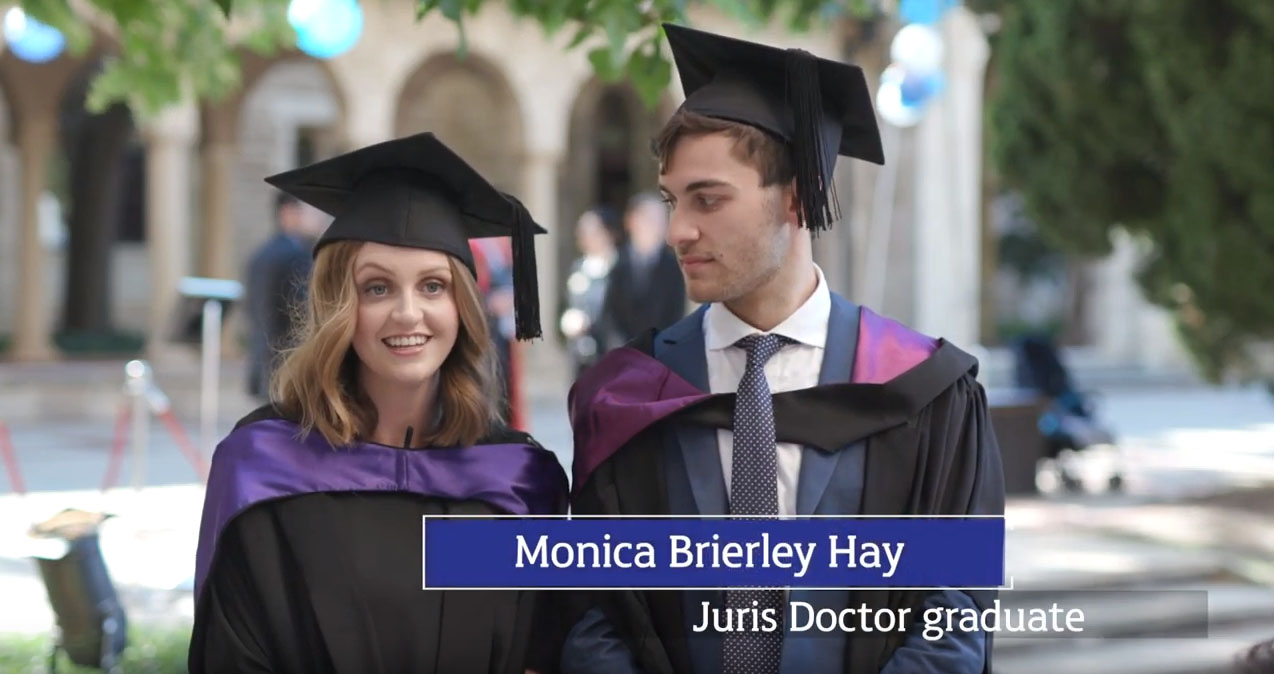Professional
Law Pathways
How to Apply
Apply through TISC
- Log in to the TISC website
If you’re a Year 12 student studying a WACE course at a WA high school or a pathway program, you are already automatically registered with TISC. - Select your preferences
You can choose up to six preferences when you apply through TISC. You should list your preferences in order from your most desired course onwards; this way you’ll have plenty of options to get into UWA. - Lodging your application
You’re almost there! After answering a few questions, you’ll need to make a declaration about your application. - Application processing fee
Your TISC application is lodged once you’ve completed the payment. For more information on fees and payments, visit the TISC website.
Contact Us
Address
M355 35 Stirling Highway Crawley
Perth Western Australia 6009
Telephone
131 UWA (131 892)
Frequently asked questions
Pathway details
The Juris Doctor (JD) is an internationally recognised, three-year postgraduate qualification that opens up a world of possibilities. Following completion of an undergraduate degree, the JD leads you to a career in legal practice. You can pursue a JD at UWA after completing a bachelor's degree in any discipline. UWA's Law School is the fifth oldest in Australia and ranks in the top 150 for Law and Legal Studies, according to the QS World University Rankings by Subject 2024.
Lawyer
Juris Doctor fee categories explained
About this course
By choosing to pursue a career in law through the UWA JD, you will:
- benefit from the Law School's longstanding and deep links with the legal profession which contribute to consistently high rates of employment for our graduates
- learn from the very best of the legal profession and academic staff recognised nationally for excellence in teaching and research
- join the ranks of nationally and internationally renowned alumni including Queen's Counsel and Senior Counsel barristers, solicitors, academic lawyers and Rhodes and Fulbright Scholars. Six of Australia's High Court judges graduated from the University
- have the opportunity to participate in practical skill-building programs, such as the Philip C. Jessup International Law Moot Court Competition, the world's largest of its kind.
Juris Doctor graduate attributes
Problem solvers who have a deep practical and theoretical mastery of subject matter; are critical and creative thinkers; and understand the ways in which local, national and global contexts influence and shape the law.
Culturally competent legal professionals who have engaged throughout their degree with Indigenous knowledges, cultures and perspectives and are well equipped to work respectfully across cultural contexts.
Relationship builders who listen with empathy; communicate effectively; and create constructive and collaborative connections with colleagues, clients and communities.
Resilient and reflective learners who are adaptable thinkers; have developed skills for critical self-reflection and lifelong learning; and understand the importance of, and have developed practical tools for, managing their well-being and supporting the well-being of others.
Global citizens who understand the importance of the ethical and professional practice of law; are outward-looking in the search for solutions; and able to engage on national, transnational and international levels.
You may also be interested in these postgraduate courses
International recognition
Graduates include six High Court judges
Pathways for mature-age students
Course Co-Director, Murray Wesson

Murray Wesson is Co-Director of the Juris Doctor and teaches Human Rights: Law and Context (LAWS2224), Constitutional Law (LAWS5101) and Advanced Public Law (LAWS5209).
His research explores topics such as free speech, the rule of law, and proportionality, from an Australian and comparative constitutional law perspective.
Standard entry
Assured Pathways for high school leavers
- UL001 (Arts) - BA + JD
- UL002 (Commerce) - BCom + JD
- UL050 (Criminology and Criminal Justice) - BCCJ + JD
- UL034 (Human Rights) - BHumR + JD
- UL004 (Science) - BSc + JD
- UL005 (Philosophy [Honours]) - BPhil (Hons) + JD1
- UL012 (Philosophy, Politics and Economics) - BPPE + JD
- ULU30 (Psychology) - BPsych + JD
- ULU58 (International Relations) - BIR + JD
Follow your passions and shape your own path towards a career in law
You can choose any UWA bachelor’s degree for your Assured Pathway to the Juris Doctor. If a bachelor’s degree isn’t listed on TISC, you can apply for the closest Assured Pathway option and email UWA Admissions to advise us of your preference.
You’ll first receive an offer for the applied Assured Pathway to our Juris Doctor via TISC, followed by a confirmation offer letter from UWA for your preferred pathway.
To confirm your place to your preferred pathway, you’ll need to accept the confirmation letter sent from UWA.
Your confirmation offer letter from UWA will be sent between 1 and 3 business days after you receive your initial offer via TISC.
- 100 (Assured Pathway)
250 (Standard pathway)
- ATAR only
- None
- Completion of a UWA bachelor’s degree with a minimum GPA of 5.5.
[1] This Assured Pathway is also available through the Bachelor of Philosophy (Honours). Students taking this pathway require a minimum ATAR of 98.00 and will take an additional year to complete this course.
JD study plan
The JD curriculum has been purposefully designed to scaffold sequential knowledge and skills progression, and may be completed in three years full-time or on a part-time basis (up to nine years). Students with external commitments (including but not limited to work, travel, clerkships and sporting commitments) are expected to plan these commitments around their studies. External commitments are not regarded as valid reasons for timetable changes, swapping tutorials, the waiving of pre-requisites or variation from the prescribed course structure*.
In making a decision as to whether to complete the JD on a full or part-time basis, students should be aware that the estimated time commitment for a full-time (4 units) enrolment is approximately 46 hours per week excluding examinations. Some units are also offered as intensives, either in semester breaks or between semesters. Although the contact hours for these units are compressed into a shorter period of time, the time commitment of the unit remains the same.
* Students who undertake exchange, or other commitments which involve official representation of the Law School or the University, or which are recognised under University Policy, may seek approval from the Deputy Head of School (Students) for a variation in the prescribed course structure.
Full time course structure
Year 1- Foundations of Law and Lawyering# (Sem 1)
- Criminal Law (Sem 1)
- Contract (Sem 1)
- Property (Sem 1)
- Foundations of Public Law (Sem 2)
- Torts (Sem 2)
- Interpretation (Sem 2)
- Land Law (Sem 2)
- Dispute Resolution# (Sem 1)
- Constitutional Law (Sem 1)
- Equity and Trusts (Sem 1)
- Option 1 (Sem 1)
- Corporations Law (Sem 2)
- Remedies (Sem 2)
- Administrative Law (Sem 2)
- Option 2 (Sem 2)
- Professional and Ethical Practice# (Sem 1)
- Evidence (Sem 1)
- Option 3 (Sem 1)
- Option 4 (Sem 1)
- Procedure (Sem 2)
- Option 5 (Sem 2)
- Option 6 (Sem 2)
- Option 7 (Sem 2)
# These units are taught intensively over a two-week period immediately preceding the start of Semester 1.



 Graduate Diploma in Law
Graduate Diploma in Law Master of Taxation Law
Master of Taxation Law
 Business Law
Business Law
 Law and Society
Law and Society Criminology
Criminology